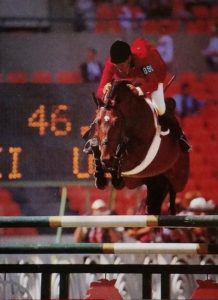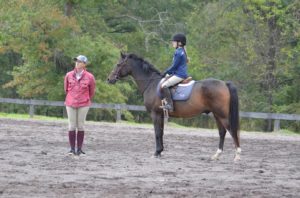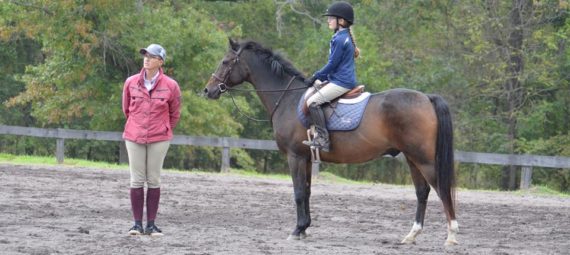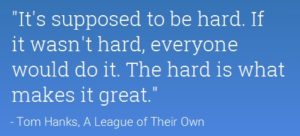
“Before I went to the Olympics I rode all kinds of horses: big and small, cold and hot, ones that stopped, ran away, stood up on their hind legs. To be a great rider you really should be able to ride all different sizes and shapes, hunters and jumpers, dressage horses. That’s the way I was taught, and I think it makes you a better horseman.”
-Anne Kursinski, five-time U.S. Olympic Show Jumping veteran
Everyone Wins a Prize
Our culture of “everyone wins a prize; there are no losers” has encouraged people to feel like they are the same. No one is better than anyone else; no one is worse than anyone else. Parents encourage their children to be “nice,” as if getting along with others (at the expense of everything else) is the only thing that matters. We are safe that way. The problem with this perspective is that it makes it difficult for anyone to strive to be better or stand out. In trying make everyone feel like a winner, no one is a winner. If we’re all as good as the next person, where is the motivation to improve? If we’re already good enough, why try to be excellent?
Let Me At ‘Em
When I was a kid learning to ride, I couldn’t wait to get onto the next horse. I kept a written log of every horse I rode and I wanted that list as a long as possible. If I saw another rider having a difficult time with a horse, I would think, “Let me on him, I want to try to fix it.” I see less of that sentiment in today’s riders. I chalk it up to most riders’ efforts to NOT stand out. In this day of “everyone gets a medal,” we have created an environment where it’s not desirable to stand out and be the best at something. Everyone is good enough, we want to get along with everyone, and the idea of standing out inspires fear instead of pride.

When riding a new, green or difficult horse, a rider may risk failure. What if she isn’t good enough to fix the problem, to overcome the challenge or obstacle? She may have talked herself up, only to find that she isn’t as good as she thought. Not only did she let herself down, she did it publicly. That’s scary. That’s social devastation. So she chooses to sit quietly, to think less of herself. She says, “Oh I couldn’t…ride that, say that, write that, do that….” She stands by, she evolves into a wallflower. She seeks comfort in the known. Status quo is good, and there’s no risk and no harm to her self worth.
Unfortunately, if we think that way when we approach trying new things in riding, our development gets stymied due to not pushing our boundaries. Perhaps an entire generation of riders has been affected by this way of thinking. I see it often.
I know that I am on this earth to positively impact riders’ view of themselves, and help them believe they can do anything, even ride the stubborn or unruly horse they never thought they’d have the guts for. All the effort to learn to work with each horse – whether it’s that rider’s particular type of ride or not – develops confidence, grit and inner strength, and that carries over into the rest of their lives.
You Will Fail, Until You Don’t
While you learn to ride a new horse, try to fix a problem horse, or strive to be the best in a class, you will be bad at it until you work at it enough to improve. In a “blue ribbons for everyone” world, being better than others (success), or being worse (failure), feels like an overwhelming burden. During the struggle, you will be different. You won’t conform. You are taking a risk. So you may think it’s easier to stay in your lane; to acquiesce and support the organism that is your present social structure, and NOT STAND OUT.
Youngsters today are literally dying to fit in. There is so much pressure to fit in and be accepted by whatever group they are trying to stay a part of, that they will do anything to conform. When they don’t, they exit, in whatever way they know how. I fear that our current culture of “everyone gets a prize” supports that. Fitting in feels better than standing out. Where does it end?
It’s Okay To Not Fit In
Riding can help relieve you of the need to fit in at all costs. If you have the right trainer and barn environment, it will enable you to take a chance. Your trainer will support you in your highs and lows, during your struggle for skill acquisition. Your barn mates will cheer you on in your struggle, for everyone is in the same boat. You can build confidence and inner strength when you learn to (temporarily) fail in your small group. When mistakes are acceptable and even encouraged, you have a chance to hone your craft and become a better horsewoman.
When you’ve found the right “barn home,” mistakes don’t equal failure and won’t be a blow to your self esteem. Instead, your education will bloom, and so will your resilience and confidence.
So – with help – try riding the tougher horse, try riding in the more challenging environment, try the bigger classes. Stretch your boundaries and you may end up surprising yourself.




One thought on “Blue Ribbons For Everyone”